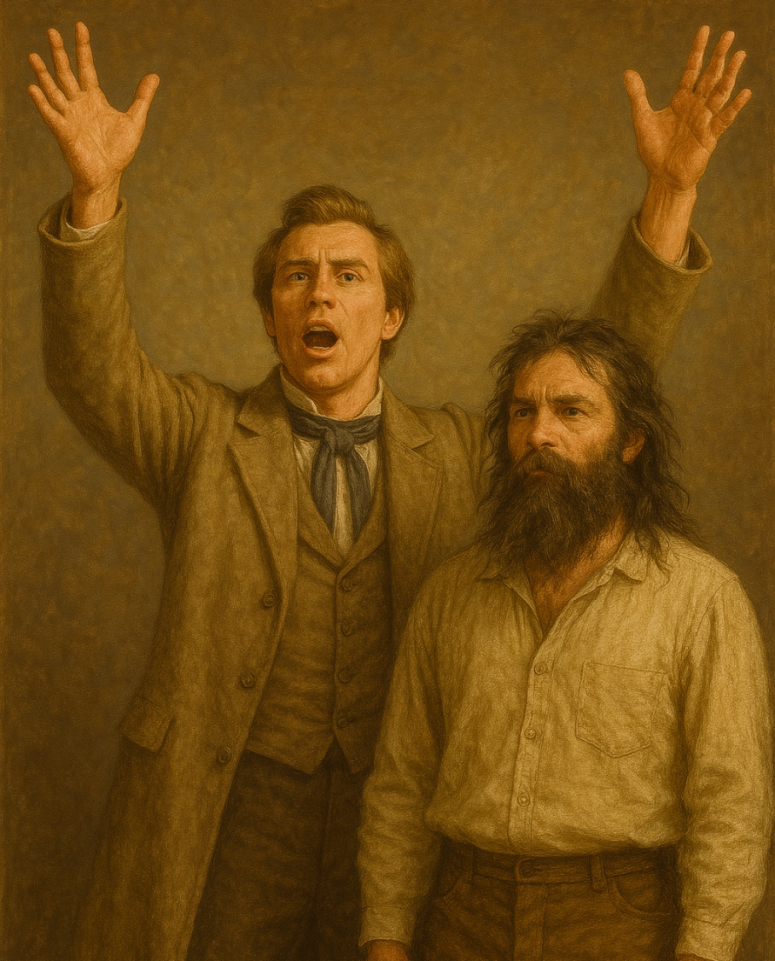Joseph Smith’s Prophecy About Porter Rockwell’s Hair
Porter Rockwell was known by many nicknames. Perhaps one that is noteworthy is “The Mormon Samson.”
Before we get into the prophecy that earned him that title it perhaps would be valuable to get some background on Samson from the Old Testament.
Who was Samson
Samson is one of the most well-known figures in the Bible, remembered for his incredible strength—and the secret behind it. His story is found in the Book of Judges, chapters 13–16, and it begins with a prophecy that set him apart from birth.
A Nazirite from the Womb
Before Samson was born, an angel of the Lord appeared to his mother, a barren woman, and told her she would bear a son. This child was to be a Nazirite from the womb, a person specially consecrated to God. As part of this sacred vow, Samson’s hair was never to be cut. The full Zazirite vow is outlined in Numbers 6.
The uncut hair symbolized ongoing devotion and separation to God. In Samson’s case, it became the sign of a supernatural calling: “He shall begin to deliver Israel out of the hand of the Philistines” (Judges 13:5).
The Power in the Hair
As long as Samson kept his vow, he displayed unimaginable strength—slaying lions, defeating armies, and tearing down city gates. But when he revealed the secret of his strength to Delilah, and she had his hair cut, his power left him.
Captured, blinded, and humiliated by the Philistines, Samson eventually cried out to God one last time. As his hair began to grow again, so did his strength. In his final act, Samson collapsed a Philistine temple, sacrificing himself to defeat Israel’s enemies.
So with that background…
The Prophecy of Joseph Smith Regarding Porter Rockwell
After 9 months as a prisoner in Independence Jail, Porter walked out a freeman on December 13th, 1843. It took him 2 weeks to make the journey back to Nauvoo where he arrived on Christmas day.
On this day, fifty couples had come by invitation to the home of the prophet Joseph Smith to celebrate the Christmas season with food and dance. During the festivities, there was a ruckus at the front door where Joseph’s bodyguards were fighting to subdue and eject what they perceived to be a drunken man who was “punching and jabbing in every direction.
When Joseph caught sight of the man, he realized who it was. In Joseph’s words: “To my great surprise and joy untold, I discovered it was my long-tried warm, but cruelly persecuted friend, Orrin Porter Rockwell, just arrived from nearly a year’s imprisonment, without conviction, in Missouri.” [History of the Church, Vol. VI, pp. 134-135]
After Porter shared his story with the group, Joseph is said to have sat quietly for a few minutes and then announced for all to hear a prophecy that would follow Porter for the rest of his life.

The exact words of the prophecy were not officially recorded, but they were widely spread throughout Nauvoo. Perhaps the best reference we have was recorded the following morning in the journal of James Jepson:
The Prophet then told Porter not to cut his hair, but to wea it long, and to live faithful and that his enemies would have no power over him, that they would not be able to take his life.”
Another common reporting which claims to be a direct quote of the prophesy that was well published is as follows: “I prophesy, in the name of the Lord, that you –Orin Porter Rockwell– so long as ye shall remain loyal and true to they faith, need fear no enemy. Cut not they hair and no bullet or blade can harm thee.”
Did the Prophecy Come True?
For the rest of his life Porter was never shot or stabbed. So I suppose that is the best testament to the fulfillment of Joseph’s prophecy. He was involved in more than his share of violent situations and gunfights but was not harmed by blade or bullet.
In his old age, he did eventually cut his hair. In approximately 1855, during a trip to California, Porter met the widow of Don Carlos Smith, the brother of his long-time friend and prophet Joseph Smith. The widow was recovering from typhoid fever and from that experience, she had lost her hair. Porter had his hair cut to make her a wig and “from that time he said that he could not control the desire for strong drink, nor the habit of swearing.” [Letter from Mrs Elizabth D.E. Roundy. Church Historical Department]
